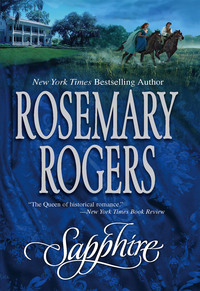Читать книгу: «Sapphire», страница 3
3
Three weeks later
“There you are, ma chère. I thought you had gone to bed.” Armand stood barefoot in a silk dressing robe on the edge of the garden patio outside his bedchamber, staring into the darkness. Torchlight behind him cast shadows over the stones at his feet and the end of his slender cigar glowed in the night.
“You are not supposed to be smoking or drinking—you know that.” Lucia strode up to him and snatched the cigar from his lips to place it between her own, then inhaled deeply.
Armand chuckled and lifted his other hand to take a sip from his crystal tumbler. “Ah, Lucia,” he murmured thoughtfully, enjoying the burn of the rum. “I will miss you.”
“You certainly will.” She exhaled and the smoke curled around her head and rose, dissipating in the warm night breeze. “With no one to keep you from drowning yourself in rum, you’ll be dead in six months’ time.”
Armand grinned, continuing to stare out into the jungle beyond the house, swirling the last of the rum in the crystal glass. “Sometimes, I think, ma chère, I should have married you and not Sophie. You, I think I could have made happy.”
“You’ve already had too much rum, haven’t you.” She inhaled on the cigar again. “And I am far too old to be anyone’s chère, certainly yours. Besides, you had your chance with me in New Orleans years ago.” She moved to stand beside him. She spoke again after a moment, softening her voice. “She was happy, you know, perhaps not in the same way you might have hoped, but she was happy with the life she chose with you.”
“The life that was forced upon her, you mean.”
“You are mistaken, Armand, if you think Sophie married you unwillingly. She would not have disrespected you or herself or Sapphire in that way.”
“I loved her, you know, very deeply. And even after a year, I still miss her so much. Though she never loved me as she loved her Edward, she still made me very happy, and now that I’m without her, each day seems hollow and empty. Even the native girls I bring to my bed cannot…” He sighed. “The loneliness remains.”
“She loved you, Armand. Surely you must know that.” Lucia said. “And Sapphire loves you.”
“Which is why she must go now,” he said firmly. “I do not care what she says, she will be on that ship tomorrow when it sails.”
Lucia groaned. “You know I have not been in agreement with this idea of yours from the beginning. Because she loves you, Armand, I think you need to reconsider. One year, what would one more year matter? She would be a year older, a year wiser and—”
“Non,” he said, clasping the glass tighter in his hand. “I will not have Sapphire throw her life away to the likes of Maurice Dupree or any man like him, and I will not allow her to sit here and watch me waste away.” He looked at her shrewdly. “And I will not have you tell her about my illness, either, do you understand me? If she knows I am sick, I will really have to tie her and crate her to put her aboard that ship tomorrow. Non, it is time my dear daughter had her wings and I will not clip them with my human frailty.” He drew his hand over his abdomen. “It seems as if a fire burns in my stomach day and night, and now I am spitting up blood. I will not allow her to watch me die!” The exertion of his conviction made him cough furiously.
Lucia sighed. “Oh dear, Armand.” She reached out to smooth his back with her hand, waiting for the spasm to pass. “Don’t work yourself into a fit.”
“I’m not,” he wheezed, struggling to catch his breath, pressing his hand against his stomach. “But neither you nor my fille will coax me from my path this time. My wishes will be done. Sapphire will return to London as my dear wife wished, and her father will lay her rightful claim upon her.”
He cleared his throat, allowing his mind to drift as he thought of the lovely young woman who was his daughter. Since he had first seen that precocious three-year-old in the New Orleans parlor, surrounded by courtesans, he had known she was destined for great things. He had fallen instantly in love with Sophie, in part because of her sad eyes. Sapphire had been a striking beauty, even as a child. She had the lovely face and the remarkable rich auburn hair of her mother, and the piercing eyes—one blue, one green—that he later learned were her father’s. She had grown into an even lovelier young woman, and was desired by many, but conquered by few, he realized. “My only regret, ma chère,” Armand mused aloud, “is that I am not able to take Sapphire to London myself.”
“I shall care for her as my own daughter, you know that.” Lucia drew the cigar away from her lips. “I promise you. I’ll see that her father recognizes her or he’ll have me to contend with, and Lord Wessex doesn’t want to challenge a girl from the London docks, I promise you that.”
He smiled and reached for Lucia, wrapping his arm around her shoulder. “Come to my bed, ma chère. There is no reason why two old friends cannot keep the sheets warm for each other.”
She smiled up at him. “Good try, Armand, but speak for yourself. I am not old.”
“Not old!” He laughed and then coughed again. “What must you be?”
She dropped the cigar to the stone patio and ground it out with the toe of her silk slipper. “My age is none of your concern or anyone else’s.” She turned away, flipping back the skirting of her silk dressing down and lifting her head high. “This old whore intends to go to London, and once Sapphire is properly wed and bed to a man befitting of her station, she intends to find a rich man to see to her needs in her declining years.”
Armand tipped his gray head back and laughed. “I have no doubt you will do exactly what you set out to do, ma chère Lucia. That’s why I can see the end of my life now, because Sophie’s dream will come to fruition. You, my dear, will see to it that our Sapphire will become Lady Sapphire Wessex, or I know you will die trying.”
“Still awake?” Angelique whispered.
Sapphire lay on her back beneath the immense silk canopy of her bed, listening to the familiar night sounds of the jungle. Moonlight spilled through the floor-to-ceiling windows of the bedchamber. The bed was placed in the center of the room where it would get the most ventilation on hot summer nights. The sheer draperies fluttered in the night breeze.
“How could I possibly sleep?” Sapphire whispered back, glancing at the fine china clock on the bed table. It was after midnight.
Angelique stretched sensually beside her on the bed, raising her slender arms above her head. The bedchamber was supposed to be Sapphire’s alone; Angelique had her own room of equal size and luxury a short walk down the hall, but the two girls often shared a bed. “It is exciting, isn’t it? Tomorrow we set sail on the greatest adventure of our lives!”
“I’m not certain exciting is the word I would choose,” Sapphire answered. “I cannot imagine being trapped on that ship with Lady Carlisle and Lady Morrow for three weeks. I fear I’ll go mad with their incessant gossiping and ridiculing.” She stared at the ceiling as she lifted arm over head to rest her wrist on her forehead. “I still can’t believe Papa is sending me away.” Her initial response to her father’s decision to send her to London had been to refuse out of stubbornness, but in truth, she wanted to get away from Maurice. And though she had mixed feelings about finding her father, it was important to her that she do it for her mother.
“He’s sending you away because he knows the world has great things in store for you. He has always known it. We all have.”
“What great things? That’s ridiculous!”
“The daughter of an earl?” Angelique dangled the words as if they were a sweetmeat. “I see you as a highborn lady, making your entrance into London society dressed in a lavish ball gown, the suitors clamoring to have just one dance with the Lady Sapphire.”
“And why in heaven’s name would I want to dance with any man?”
“You must dance so that you can meet and marry a great man, of course. You know it’s always been your dream. It’s why you read those silly novels and poetry all the time, isn’t it? Because you fancy romantic love?”
Sapphire frowned. Marriage was the furthest things from her mind. She was in too much turmoil to even contemplate such a thing, even if it was inevitable. “I don’t understand why you’re so eager to go, Angel. This is our home! There’s so much I’m going to miss, and not just Papa and Orchid Manor. I don’t know that I can bear to leave my horses.”
“Don’t be silly. They have horses in London.”
“This seems so easy for you and I don’t understand. You were born here. Our mothers died in this place.”
“I’m eager to go because there’s nothing to keep me here. Our mothers aren’t in those graves,” Angelique said with her usual practicality as she sat up beside Sapphire, resting her back against the headboard. “And Armand isn’t my father.”
“You don’t know that.” Sapphire picked at the thin fabric of her knee-length sleeping gown. “He could be.”
“So could any number of white men on this island, you know that.” She looked at Sapphire in the darkness. “But that was never important to me. What’s important is the journey we’re about to embark upon.”
“You know that when we arrive in London, things will be different, there. Everyone here loves you, but—”
“Some better than others!”
“But the way you give yourself so freely to men,” Sapphire continued diplomatically, “might be…might be misinterpreted.” It seemed to her that Angelique had always been a sexual creature, even from the time they were little girls. Certainly from the time Angelique was fourteen and had climbed through the bedchamber window after lights-out to surrender her virginity to a neighboring plantation owner’s sixteen-year-old son.
“You worry too much,” Angelique told her. “I am what I am, just as my mother was what she was, and I will not apologize for either of us.”
Sapphire glanced at Angelique. “We could find you a husband, too, you know. You look more French than native and Armand has already said you must use his surname when we arrive in London. With Armand’s name and the money Mama left you, surely—”
“Marriage is your dream, puss,” Angelique said as she gave Sapphire a gentle push, “not mine, nor will it ever be.” She stretched lazily, like a cat. “I want to get to know a hundred men, a thousand, and not over biscuits and tea.”
“Angel, the sisters and Lady Carlisle were all correct. You’re quite incorrigible.”
“Quite.” Angelique turned her head, a mischievous smile on her face. “What’s amazing is that you’re still so naive,” she teased, “especially now that we know you were brought up amidst such bawdiness—your mother and Lucia’s colorful past in New Orleans, Armand and his slave women, me.”
Sapphire said nothing. She wasn’t like Angel. She couldn’t accept change so easily, especially not when she had believed one thing her whole life only to find it untrue. Three weeks had passed since Armand told her the truth about her mother and herself and she was still trying to make sense of it all. The more she thought about it, the angrier she became with her father, this Edward. Why hadn’t he tried to find her mother? Had he looked for her at all or had he just gone along with the annulment and the new marriage arranged by his family? She intended to ask him just that the moment she saw him. It had been her mother’s dream that Sapphire meet her father, to be drawn into the loving embrace of the family, but what Sapphire wanted was an apology—that and to be recognized as Edward’s daughter, but not because she wanted any sort of relationship with the man. She wanted the recognition for her mother’s sake. And for that reason, she was going to London. Not for Armand, not for herself, but for her mother.
“Now we’re off to begin the journey Sophie dreamed of,” Angelique murmured. “You to find your rightful legacy and a handsome, titled man to wed, and me to sample an entire new continent of men!”
“I’m not sure that is what my mother had in mind.” Sapphire absently reached out to stroke the delightfully smooth silk of one of the bed draperies. “Please don’t put it in quite those terms at the dinner table when Lady Carlisle asks you of your plans once we arrive in London. I overheard her talking with Aunt Lucia yesterday and she is not at all pleased that you are being included in the traveling party, though she didn’t actually say that to Papa. I think her husband’s business profits with Papa are far too great to deny the request to escort us, but she has managed to get her invectives in just the same. I do believe she suggested to Aunt Lucia that you might search for a good position as a lady’s maid.”
“I’ll try to hold my tongue for your sake,” Angelique replied with a laugh. “It’s the least I can do, considering that Lady Carlisle has barely recovered from the incident at the falls. I understand Lord Carlisle was quite taken with us both.”
Sapphire couldn’t resist a smile as she slid down in the bed, thrusting a pillow under her head. “We should get some sleep,” she said. “Four will come early. Papa says we’re to sail at first light while the tide is favorable.”
Angelique slid down beside Sapphire, drawing the light sheet over them. “I still can’t believe it’s happening. I can’t believe I’m really leaving this island.”
Sapphire smiled, and although she was not entirely eager to go, she couldn’t help but wonder what awaited her so far from the familiar shores of Martinique.
Sapphire stood on the rail of the sailing schooner the Elizabeth Mae, holding tightly to the ribbons of her bonnet. The sun was just beginning to peek above the horizon in the eastern sky, and there was a good wind that would carry them safely from Martinique’s rocky shores. She gripped the polished wood rail as she gazed down on her father and the maid, Tarasai, who had escorted him to the dock.
Sapphire knew the young native woman adored him and, in the past weeks, she had seemed to be able to cajole him into caring better for himself. Sapphire hated leaving him, but at least she knew there would be someone here for him, seeing that he didn’t smoke too many cigars or drink too much rum. She managed a smile and a wave as he looked up to meet her gaze. He had dressed carefully that morning in a finely cut coat and trousers with a starched cravat around his neck, all the latest French fashion. He wore a straw boater on his head, tilted jauntily, and in his hand was an exquisitely carved cane. Monsieur Armand Fabergine had orchestrated this fine image of the man she had thought to be her father, the man who would always be her father in her heart. A lump suddenly rose in her throat and she made a little sound.
“Steady, there,” Lucia, who stood behind her, whispered in her ear. “Remember, this is difficult for you, ma chère, but more difficult for him.”
Sapphire pressed her lips together and nodded.
One of the sailors called for the gangplank to be lifted and Armand tipped his hat.
“No, wait!” Sapphire cried, running.
She heard Lucia and Angelique call to her. She heard the high-pitched voice of Lady Carlisle. “There, you see, I warned you, sir, she will be nothing but trouble…”
But Sapphire ignored them all, gripping the skirts of her new sensible cotton traveling gown and racing down the gangplank, the ribbons of her straw bonnet streaming behind her. “Papa!”
“Sapphire, no. You must go, my daughter,” he chastised, but as her kidskin boots hit the wooden planks of the dock, he opened his arms to her.
She threw herself into his arms, burying her face in the lapel of his black coat, deeply breathing the scent of him. As long as she could remember, this smell, the feel of these arms around her, had always meant safety and security. She had always known that no matter what she did wrong or what trouble she found herself in, Armand Fabergine, her papa, would be there for her.
“Mon dieu,” Armand whispered, resting his chin on the top of her head. “Please don’t make a scene. Lord and Lady Carlisle have been very kind to agree to escort you to London. Please do not shame me.”
She looked into his eyes that were watery with emotion. “I would never shame you, Papa.” She dared a little smile. “At least, not on purpose.”
He grinned and pulled her against him. “Of course you would not, my dear Sapphire. Now you must go. All wait for you.”
She hugged him tightly. “But I’m afraid I’ll never see you again.”
“Do not be foolish, my dearest. You go only for a visit. A few months, a year, perhaps, and then you must return to Orchid Manor and tell me of all you have seen.”
Sapphire nodded because she knew that was what he needed, but she knew as well as her father that if she returned in a year’s time, he would no longer be here. “I love you, Papa,” she whispered.
“I have loved you always. Remember that.” She lowered her chin to allow him to kiss her forehead as she took in the scent of his clothing and his fine cigars, one last time. Then she turned away and walked up the gangplank to board the ship, her head held high, as befitted the daughter of an English lord.
4
One month later
“Lord Wessex, so glad to make your acquaintance at last.”
Blake turned from the open window in the law offices that looked out on the busy London street, and settled his gaze on the short, stout barrister walking toward him. “Mr. Stowe,” he said sharply, ignoring the barrister’s thrust out hand, “I am not accustomed to waiting.”
“My apologies, my lord.” Lowering his head in a cordial bow, Stowe continued. “There was a distraught widow on my doorstep this morning. I couldn’t turn her out.”
“We had an appointment, nine sharp.” Blake brushed past Mr. Stowe and the bespectacled clerk seated uneasily behind a high mahogany desk.
“Right this way, my lord.” Stowe bustled by, leading him down a short hall into a spacious office paneled with dark walnut wainscoting and two walls of floor-to-ceiling bookshelves filled with leather-bound legal volumes. “Please have a seat.”
Blake glanced down at the red leather wingback chair in front of an elegantly carved walnut desk large enough to accommodate a small dinner party. The barrister had good taste, at least. Blake had a desk similar to this in his own office back in Boston. “A Dresden Partners pedestal desk,” he said, nodding with approval. “Ebonized molding, very fine.”
“Th-thank you, my lord.” Stowe hesitated, seemingly startled by Blake’s compliment. Then he walked behind his desk, flipping back the tails of his black serge coat, and waited to take his seat until Blake sat first. “It was my father’s, God rest his soul.”
Blake eased into the chair and caught a faint scent of good French tobacco on the red leather, a scent as tantalizing as a woman’s. It was a chair he wouldn’t mind adding to his own collection. He’d lived in the mansion he’d built in the exclusive Beacon Hill area of Boston for nearly two years, but it was still not entirely furnished. He liked to choose his furnishings carefully, taking consideration with each and every chair, table and chest of drawers. It was how he preferred to acquire all of his possessions.
“Your father was obviously a prosperous man, and I can see you have followed in his footsteps.” Blake sat back, pinched the fine pleats of his black wool trousers and crossed one leg over the other. “But your firm did not come recommended by my associates here in Great Britain. No one had even heard of you when I placed inquiries. Have you the sense it takes a man to get out of the driving rain? I haven’t the time for incompetence.”
The barrister offered a hesitant smile, obviously unsure how to take measure of Blake Thixton, the new Earl of Wessex.
“I can assure you, my lord, that I am quite competent.” Stowe brought his hands together, settling into his chair. “And now the estate can be settled.” He picked up a pair of round-framed gold reading glasses and pushed them onto his nose before reaching for a pile of documents on his desk. “As stated in my letter, some months ago when Lord Wessex died without issue, his chattels were passed on to you, his closest heir by blood as the grandson of his uncle.”
Blake’s gaze drifted beyond Stowe to the shelves of books behind him. “I never knew Lord Wessex, sir, and while I was born in London, my parents immigrated to America before I was old enough to walk.”
“Funny how that is, sometimes. Makes no difference to the law, though. By the laws of English entailment, you are the legal heir of the late Earl of Wessex.” He skimmed the document written with great flourishes as if it was the first time he had seen it. “There is the title, of course.”
Blake frowned. “Of little use in America. My business acquaintances are more interested in the volume of their merchandise I can ship than what titles I hold in society in London.” Tenting his fingers, he settled his gaze on the barrister.
“The title stands throughout the world, my lord. Many Englishmen now living abroad—”
“What is there besides the title? I’m not impressed with the pretenses of society on any continent. Is there land, Mr. Stowe? Land is something that lasts. Are there coal mines? Gold bullion, perhaps?”
Stowe’s eyes darted upward, over the edge of the document and then quickly down again. “Land, yes.” He cleared his throat. “A lovely town house on the fashionable West Side of London. Very nice. I had the pleasure of attending several balls there and more than one card game.”
“I don’t gamble,” Blake said, unsmiling.
“And a country estate in…hmm, let me see.” Stowe set a page aside and began to skim the next. “Yes, here it is. Cedar Mount, in…Surrey.” He continued to study the paper in front of him but said nothing more.
Blake allowed a full minute of silence to pass, then another, thinking about the many business ventures he’d left behind in Boston to come to London and claim this inheritance. He’d have wasted six weeks’ time on this trip by the time all was said and done, and now Stowe was going to tell him that the picture he had painted in his letters was not quite as rosy as he had suggested. Blake shifted his gaze back to Stowe. It was beginning to seem that the only good thing about this trip was the fact that he’d gotten away from Clarice for a few weeks.
“The money, Stowe,” Blake said, making an effort to keep his temper in check.
“Two hundred fifty-two pound.”
“That’s it? That’s all the money Wessex had when he died?”
“Of debt. He was two hundred fifty-two pounds in debt.”
“Repeat that last remarkable phrase one last time.”
“Of debt…”
“Of debt?” Blake exploded, coming out of the chair and slamming both palms on the desktop.
Stowe blinked but did not startle. Blake had to admire him for that. There weren’t many men who could look him in the eyes after one of his outbursts.
“But the properties are fine ones,” Stowe offered.
Blake sat down again, this time only on the edge of the leather chair. “I don’t have time to sell real estate. I told you my trip would be brief. I have a shipping business to run in Boston.”
“I…I’m certain arrangements could be made…I could sell the properties for you or you could hire a land broker, but…but there is the issue of the family.”
“The family? What family?”
Blake presently had no family of his own and found the entire concept bothersome in general. He knew marriage was inevitable and he did hope to have a son one day to pass the business to, but so far he had done an admirable job of sidestepping any serious relationships—including one with his closest business associate’s eldest daughter, Clarice. It wasn’t that he didn’t like women; he adored them. He adored them elegantly dressed for the dinner table and then elegantly undressed in his bed, preferably not speaking. He also liked maids, cooks, seamstresses, and even preferred them because they never possessed any expectations beyond their own immediate pleasure. They had no delusions that a smile or a pleasant word or a tumble in bed would lead to a marriage proposal and a mansion on the bay.
“I have no family!” Blake fumed.
“The late earl’s family, the Countess of Wessex and her three daughters by her late first husband—Lady Camille Stillmore, Lady Portia Stillmore and Lady Alma Stillmore.”
“You apparently know the family well enough to rattle off the names without looking them up, which means the countess has been here to see you. Perhaps she was even the distraught widow on your doorstep this morning? And the late earl made no arrangements for his wife and stepdaughters, should he predecease them?” Blake asked, again barely keeping his temper balanced.
“My lord,” Stowe said delicately, “rarely do men think they are going to die. Some even fear that if they do make preparations, it will hurry them on their way.”
Blake smiled and looked away. It was truer than he or any man cared to admit. His own father, a cold, hard man but an astute entrepreneur, had died without leaving a will or any means to support his wife, Blake’s stepmother. Had it not been for Blake, she would have been penniless and on the street, because like his English father before him, Josiah Thixton had left all he possessed to his eldest. Not that Blake begrudged his stepmother one penny of his inheritance—he saw that she continued to live in the manner in which she was accustomed until she died—but he had always wondered why his father had not guaranteed that.
Blake looked across the desk to find the barrister staring at him. He chuckled and slid back in the chair. “So there is debt, two properties and a gaggle of penniless, hysterical women—is that what you’re telling me, old boy?”
Stowe hesitated, then sat back in his chair, removing his wire-frame glasses. “I might have presented the tidings more delicately, my lord, but that is an accurate assessment indeed.”
“Why do you stand here, monsieur?”
Armand turned absently from the window, where rain trickled down the glass in rivulets, to look at the native girl standing quietly behind him. He’d found Tarasai quite by accident in the village. She was lovely, bright and, most importantly, she pleased him, not only in his bed, but in conversation. She had a gentle way about her and seemed to know instinctively when to speak and when to be silent.
“They are in London by now if they have not run into trouble on the voyage across the Atlantic.”
“The weather has been good, monsieur,” she said in a soft, lilting voice. “And the ship that carried them across the sea was a good one. Your chères filles are well, I feel it in my bones.”
She hugged herself and he could not help but smile. Then he coughed a dry, racking cough and she was at his side at once, one hand on his back, the other on his chest.
When the fit subsided, he stood again and reached into his pocket to take his handkerchief and wipe his mouth. “Ah, Tarasai, I am so tired, so very tired.”
“You should not worry so, monsieur. It is not good for your health.”
Slipping the handkerchief back into his pocket, he looked at her. “I am afraid it was wrong of me to send them away. Selfish of me. They were happy here. It should have been enough, n’est-ce pas?”
She slipped her small hand into his. “It was time for your beau papillon to be set free, monsieur. She was too big for this island, too full of la vie. Her future waits for her there across the ocean, a life of adventure and happiness.”
He sighed. “I hope you’re right, Tarasai. I will never forgive myself if she comes to harm through my ambitions for her.”
“I know that I am right,” she said softly. “It is in the stars.”
“Your coat and top, sir?” The butler met Jessup Stowe in the front hall of the prominent men’s club.
“Yes, thank you, Calvin.” Jessup gave himself a shake as he handed the servant his umbrella, then his top hat and drenched overcoat. “Still coming down pretty hard out there,” he remarked as he smoothed his thinning gray hair with the palm of his hand.
“Yes, sir. Your table is ready, Mr. Stowe, and Mr. Barker already awaits your company.”
“Thank you, Calvin.” Jessup pulled his slightly rumpled waistcoat down over his stomach, thinking that either the striped fabric was shrinking or he was gaining weight. “And thank you for taking those wet things.”
The butler nodded, backing up. “I can show you to your table, sir, if you’d just like to—”
“I’ve been eating at that table six nights a week for the past seven years since Mrs. Stowe died, Calvin. Surely I can find it.” Jessup started to turn away and then turned back, snapping his fingers. “Calvin, one more thing.”
“Sir?”
“It’s possible, though not probable, that I might have a guest coming. A Lord Wessex.”
The butler looked at him oddly.
“The new Lord Wessex, the earl’s heir,” Jessup explained with a wry smile.
“I see, sir.”
“He’s an American and doesn’t know his way around London, so I think he might be a bit out of sorts tonight.”
“I’ll show him to your table at once, Mr. Stowe, should he appear.”
Looking both ways to be sure no one was watching, Jessup slipped a coin from the small pocket of his waistcoat and handed it to the butler. “I know Mr. Porter prefers we not tip personally,” Jessup said quietly, “so just between you and me. You’re always so kind to me, Calvin. Kinder than any of my sons has ever been.”
“Yes, sir. Thank you, sir.” Calvin took one last step back, then turned, pleased and trying not to show it, and hurried down the hall.
His waistcoat reasonably straight, Jessup walked into the parlor of the prominent though slightly threadbare men’s club frequented by barristers like himself. He nodded to several gentlemen at the bar and proceeded to the dining room beyond. His old friend, Clyde Barker, also a widower, was already at the table, already on his first glass of scotch.
Начислим
+10
Покупайте книги и получайте бонусы в Литрес, Читай-городе и Буквоеде.
Участвовать в бонусной программе








